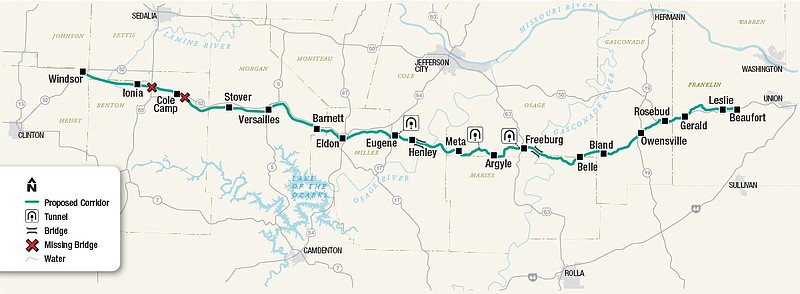Spanning 140-miles across Missouri, the proposed development of the Rock Island Corridor into a state park is eagerly awaited by trail goers but opposed by some landowners.
Representatives from the Missouri Farm Bureau (MOFB) have consistently shared their opposition for trail development without compensation for landowners who would be affected.
"Missouri Farm Bureau opposes the decision to move forward with the proposed Rock Island Trail as a state park and believes it is an affront to private property rights," said Garrett Hawkins, MOFB president. "Landowners' easements have only granted use of the corridor for a railroad, which has been dormant for several decades. Landowners have not yet been compensated for their taken land and the decision has been pending with a federal court for the past seven years."
Easement details vary, but multiple landowner easements allow only for construction and operation of a railroad, not a recreational trail, the MOFB legal team said. In these cases, landowners have the ability to seek compensation through federal court.
As of now, there are 358 landowner cases, 29 of which have been dismissed, regarding compensation and the Rock Island Corridor's trail conversion.
Meghan Largent, practicing attorney at Lewis Rice LLC, represents more than 250 landowners on the corridor.
"They (the federal government) amended the (National Trail System) Act in 1983, and what they did was they inserted a sentence that simply said ... we the federal government say the railroad can sell it for a public park, and it won't be considered abandoned by the railroad," Largent said. "Meaning that in any state, like Missouri, that said when railroad easements are abandoned, that property is unencumbered, it goes back to the underlined landowner, that's not going to happen anymore."
After the amendment passed some Vermont landowners sued, stating the amendment was unconstitutional, but lost their case in the U.S. Supreme Court, Largent said.
"What the Supreme Court ruled was that this is eminent domain. It's the federal government deciding to take private property for a public purpose," she said. "That is constitutional."
What the Constitution says about that, however, is that they must be paid just compensation, she added.
"The owners I represent are not trying to stop the trail. They are not trying to get their land back. They're not trying to take away funding from the trail," she said. "We're simply asking for the fair market value, there's no punitive damages."
The funding for judgments in the Court of Federal Claims come out of the Judgment Fund, Largent said.
"It's money that sits over at the Treasury Department. It's appropriated by Congress to pay the debts and liabilities to the United States," she said, noting that it would not affect any of the funding going toward the trail itself.
Some MOFB members whose land could be affected also have concerns regarding trespassing, potential liability, the trail conversion process, fencing and maintenance, Hawkins said.
"Landowners along the Rock Island Corridor deserve to have their rights respected, and the decision to fund and construct a new state park on land that owners have not yet been compensated for is unwarranted," Hawkins said.
The push for compensation prior to trail development in part comes from the development of the Katy Trail -- a nearly 240-mile state park stretching horizontally across the middle of Missouri, that was also converted to a state park from a former rail corridor.
"The Katy Trail is an example of inverse condemnation, in which the government took and then landowners were paid later," Hawkins said.
Landowners affected by the Katy Trail development were compensated by the federal government in the case of Glosemeyer v. United States, which was filed in 1993, but judgment was not passed until 2004.
"The government took while landowners waited," Hawkins said. "Learning from that experience, that informs us as to why landowners along this corridor are very much concerned and believe that they need to be taken care of now, before this project were to proceed."
Also of concern for MOFB members and some Missouri lawmakers, are the unmet needs across the current state park system.
"When you see a deferred maintenance backlog of over $100 million, I'm hearing more from our members ... 'Yes, we need to be compensated for this taking, but also shouldn't the state take care of unmet needs before we venture down the path of potentially adding another state park,'" Hawkins said.
The Missouri House passed its version of the state budget, including more than $70.7 million for funding to make the Rock Island Trail a reality, the News Tribune has reported. The money would come from the state's portion of American Rescue Plan (ARPA) COVID-19 relief funds.
Last Thursday, the Senate Appropriations Committee cut the initial $3 million approved by the House to begin trail development to zero dollars, the Missouri News Network has reported, citing lawmaker concerns on the deferred state park maintenance and timing issues.
The Senate is expected to continue debating appropriations for the ARPA funds and the Rock Island Trail during the 2022 legislative session.

